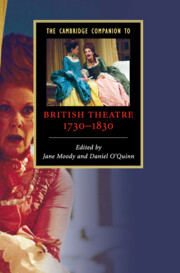7 - Pantomime
from Part II - Genres
Published online by Cambridge University Press: 28 May 2009
Summary
Throughout this period, an evening's programme at the theatre did not end when the curtain fell on the mainpiece play. Most evenings, that play - a revival of Shakespeare's Hamlet, say, or a new work such as Richard Sheridan's The School for Scandal (DL, 1777) - would be followed by an afterpiece: a one-act comedy such as David Garrick's Miss in her Teens (CG, 1747), or, on many occasions, a pantomime. These pantomimes did not much resemble anything we might today associate with the term, however. Rather, they involved a cast of characters drawn from the continental commedia dell'arte - Harlequin, Colombine and Pantaloon, among others - performing their characteristic story: Harlequin pines after Colombine; her guardian or father Pantaloon attempts to block their romance; Harlequin tricks Pantaloon and gains Colombine. This part of the performance, known as the comic or grotesque, would typically be interwoven with a serious story, one drawn from classical mythology, fairytales or popular works of fiction, such as Robinson Crusoe or The Castle of Otranto. But the true heart of pantomime lay in acrobatics, spectacle, song, dance, travelogue, slapstick and special effects. Pantomime exploited all the material resources that playhouses had to offer in order to create a kind of fantastic world where the usual rules of cause-and-effect did not apply, where spectacular transformations happened as a matter of course. The magic tricks that took place within each performance - as Harlequin transformed his environment the better to pursue Colombine, or the Clown constructed machines or vehicles out of random objects that came to hand - relied upon, and also celebrated, the magic of the theatre itself.
- Type
- Chapter
- Information
- The Cambridge Companion to British Theatre, 1730–1830 , pp. 103 - 114Publisher: Cambridge University PressPrint publication year: 2007
- 3
- Cited by



